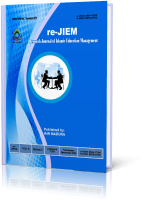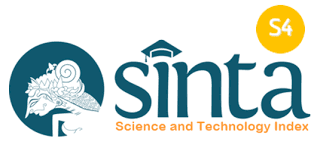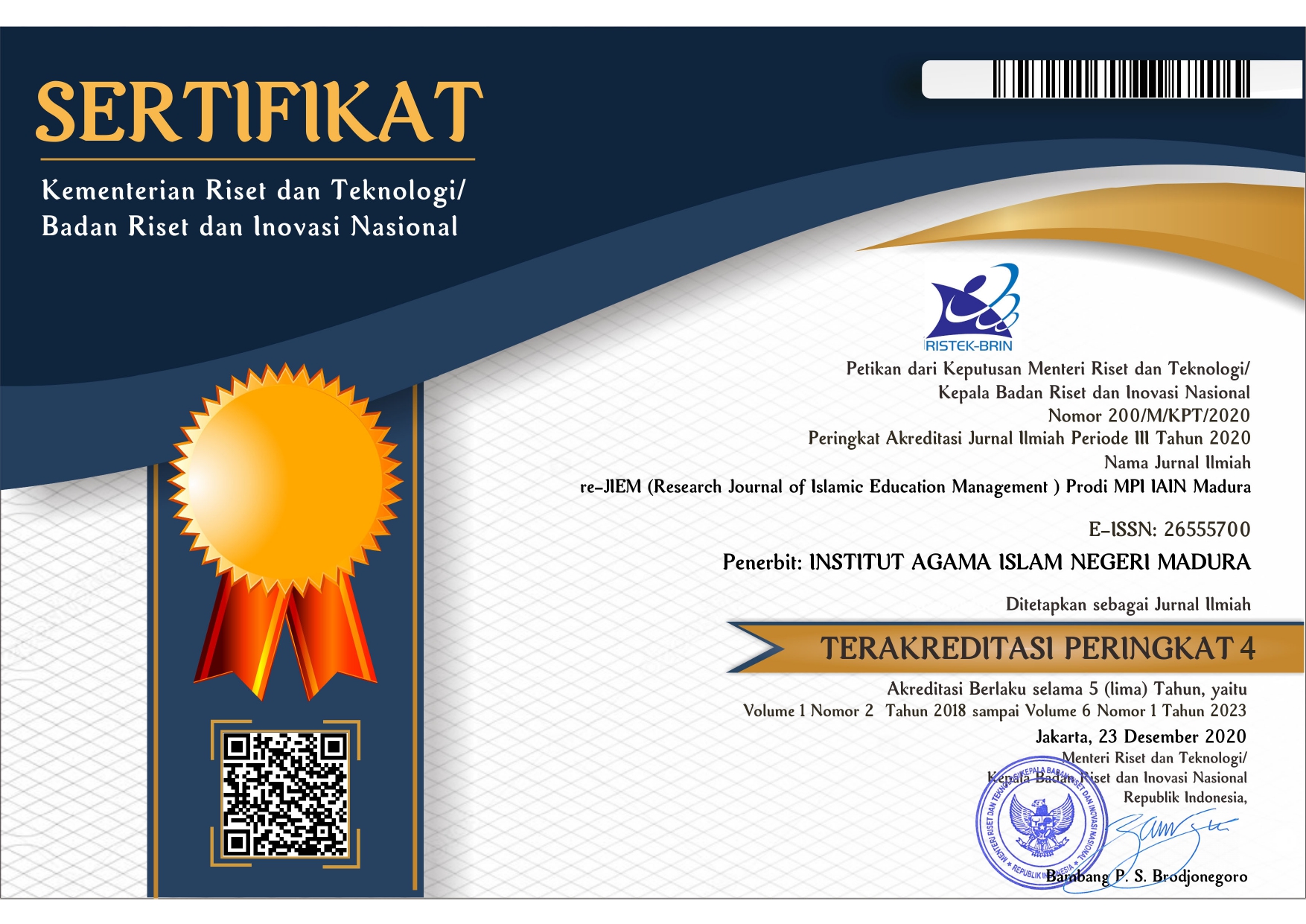URGENSI FILANTROPI ISLAM UNTUK PEMBIAYAAN PENDIDIKAN ALTERNATIF BAGI ANAK-ANAK YANG TIDAK MAMPU
 Abstract views: 560
,
Abstract views: 560
,
 PDF downloads: 505
PDF downloads: 505
Abstract
The cost of education is the main factor that has a big influence on the implementation of learning activities. Indonesia has enough problems in the economy that have caused many children from families with low incomes to be forced to not attend school, due to the lack of education costs, even to meet their daily needs is still a burden. This is also a problem that must be addressed, so as not to create educational disparities and create educational equity. The settlement of these educational problems can be overcome through social activities with a pattern of income redistribution or commonly known as philanthropy. The purpose of this study is to explain the urgency of philanthropy for alternative financing in Islamic educational institutions. This research uses descriptive analytic literature study. The results of this study are (1) philanthropic practice has become an institutionalized tradition since the emergence of Islam. (2) philanthropy has an important role for alternative financing in Islamic educational institutions through zakat, alms, waqf and various obligations other than waqf. From the results of this research, the community can be more concerned and sensitive to social interests so that they can carry out philanthropic practices that are expected for education in Indonesia.
Downloads
References
Akbar, Wahyu, Jefry Tarantang, and Noor Misna. Filantropi Islam (Regulasi Dan Implementasi Zakat Di Indonesia). K-Media, Yogyakarta, 2021. http://digilib.iain-palangkaraya.ac.id/id/eprint/3566.
Ali Ridho. “ZAKAT DALAM PERSPEKTIF EKONOMI ISLAM.” Jurnal Al-‘Adl 7, no. no. 1 (2014): 1–46. http://journal.stainkudus.ac.id/index.php/equilibrium/article/view/1268/1127.
Amar, Faozan. “IMPLEMENTASI FILANTROPI ISLAM DI INDONESIA.” Al-Urban: Jurnal Ekonomi Syariah dan Filantropfi Islam 4, no. 2 (2020): 141–152. https://journal.uhamka.ac.id/index.php/al-urban/article/view/5659.
Andiani, Kartika, Didin Hafidhuddin, Irfan Syauqi Beik, and Khalifah Muhamad Ali. “Strategy of BAZNAS and Laku Pandai For Collecting and Distributing Zakah in Indonesia.” Al-Iqtishad: Jurnal Ilmu Ekonomi Syariah 10, no. 2 (2018): 417–440.
Cohen, Mark R. “Jewish S Elf-Government in Medieval Egypt of Head of the Jews ,.” Princenton:Princenton University Press (2005).
Fironika, Rida. “Pembiayaan Pendidikan Di Indonesia.” Jurnal Ilmiah Pendidikan Dasar 1, no. 1 (2005): 43–64.
Futaqi, Sauqi, and Imam Machali. “Pembiayaan Pendidikan Berbasis Filantropi Islam: Strategi Rumah Pintar BAZNAS Piyungan Yogyakarta.” MANAGERIA: Jurnal Manajemen Pendidikan Islam 3, no. 2 (2019): 231–256.
Handoko, Wahyu. “FILANTROPI PENDIDIKAN UNTUK MENUMBUHKAN MUTU MADRASAH DI MI MUHAMMADIYAH KAWERON MUNTILAN MAGELANG,” 2018.
Hasan bin Ahmad bin Hasan Hammam. Dahsyatnya Terapi Sedekah. Jakarta: Maghfirah Pustaka, 2013.
Ishak, Khodijah, Lukman Hakim, Rizki Audina Putri, Mahfud, and Dita Nur Fatila. “Strategi Meningkatkan Minat Masyarakat Menjadi Muzakki Melalui Filantropi Islam.” Jurnal Tabarru’: Islamic Banking and Finance 4, no. 2 (2021): 551–561.
Islam, Jurnal Pemikiran, Universitas Islam, Negeri Sultan, Syarif Kasim, Universitas Islam, Negeri Sultan, Syarif Kasim, et al. “Filantropi Dalam Perspektif Al- Qur ’ an Serta Relevansinya Terhadap Kesejahteraan Sosial” 44, no. 2 (2020): 189–212.
Ismail, Hafid. “Perilaku Donasi Dan Potensi Filantropi Warga Nahdlatul Ulama (Survei Lazisnu Di 15 Kota Dan Kabupaten Di Indonesia).” Jurnal Middle East and Islamic Studies 6, no. 1 (2019): 1–16. http://meis.ui.ac.id/index.php/meis/article/view/75.
Junia Farma, Khairil Umuri. “FILANTROPI ISLAM DALAM PEMBERDAYAAN EKONOMI UMAT.” Jurnal Ekonomi Islam dan Perbankan Syariah 1, no. 1 (2021): 13–26.
Kasdi, Abdurrohman. “Filantropi Islam Untuk Pemberdayaan Ekonomi Umat (Model Pemberdayaan ZISWAF Di BMT Se-Kabupaten Demak).” IQTISHADIA Jurnal Kajian Ekonomi dan Bisnis Islam 9, no. 2 (2016): 227.
———. “MEMBANGUN KEMANDIRIAN MELALUI FILANTROPI KAUM PEREMPUAN; Potensi Kedermawanan Untuk Pemberdayaan Perempuan Indonesia.” PALASTREN Jurnal Studi Gender 12, no. 1 (2019): 99.
Latief, Hilman. “Filantropi Dan Pendidikan Islam Di Indonesia.” Jurnal Pendidikan Islam 28, no. 1 (2016): 123.
Makhrus, Restu Frida Utami. “Peran Filantropi Islam Dalam Pemberdayaan Masyarakat Di Role Of Islamic Philanthropy In Community Empowerment District Banyumas.” Seminar Nasional, no. September (2015): 175–184.
Mellyan, Mellyan, and Inayatillah Inayatillah. “Konsep Filantropi Islam Di Masa Pandemi Covid-19.” At-Tasyri’: Jurnal Ilmiah Prodi Muamalah 13, no. 2 (2022): 157–171.
Ni’mah, Alfun. “Permasalahan Pembiayaan Pendidikan Di Indonesia.” Seribunikmat.com.
Putri, ODAP. “STRATEGI FUNDRAISING LEMBAGA FILANTROPI ISLAM DALAM PROGRAM SOSIAL-KEMANUSIAAN (Studi Pada Lazismu Kabupaten Malang)” (2021).
Sholikhah, Nurul Alfiatus, Shelna Azima Azam, Dindha Ayu Bestari, Moh Khoirul Huda, and Ratna Yunita. “Peran Lembaga Filantropi Untuk Kesejahteraan Masyarakat Global (Studi Kasus Pada Aksi Cepat Tanggap Madiun).” Journal of Islamic Philanthropy and Disaster (JOIPAD) 1, no. 1 (2021): 27–42.
Sugiyono. Metode Penelitian Kuantitatif, Kualitatif, Dan R&D. Bandung: Alfabeta, 2011.
Suherman, Suherman. “Penanaman Nilai Filantropi Islam Di Lembaga Pendidikan (Studi Kasus Sdi Surya Buana Kota Malang).” AL-ASASIYYA: Journal Of Basic Education 3, no. 2 (2019): 140.
Tamim, Imron Hadi. “Filantropi Dan Pembangunan.” Community Development 1, no. 1 (2016): 121–136. https://journal.iainkudus.ac.id/index.php/comdev/article/download/2578/1998.
———. “Peran Filantropi Dalam Pengentasan Kemiskinan Di Dalam Komunitas Lokal.” Jurnal Sosiologi Islam 1, no. 1 (2011): 35–58. http://jsi.uinsby.ac.id/index.php/jsi/article/view/4.
Uyun, Qurratul. “Zakat, Infaq, Shadaqah And Wakaf As Configuration Of Islamic Pillantrophy.” Journal of Islamic Studies 2, no. 2 (2015): 218.
Widyawati. Filantropi Islam Dan Kebijakan Negara Pasca Orde Baru: Studi Tentang Undang-Undang Zakat Dan Undang-Undang Wakaf. Sekolah Pasca Sarjana UIN Syarif Hidayatullah, 2011.
“Standar Nasional Pendidikan, Permen No 19,” 2005. https://osf.io/preprints/fcmve/.
Copyright (c) 2023 Syamela Massa Kaulika

This work is licensed under a Creative Commons Attribution-ShareAlike 4.0 International License.
Authors who publish with this journal agree to the following terms:
Authors retain copyright and grant the journal right of first publication with the work simultaneously licensed under a Creative Commons Attribution-ShareAlike 4.0 International License that allows others to copy and redistribute the material in any medium or format with an acknowledgment of the work's authorship and initial publication in this journal and also allows to remix, transform, and build upon the material for any purpose, even commercially with contributions under the same license as the original.
Authors are able to enter into separate, additional contractual arrangements for the non-exclusive distribution of the journal's published version of the work (e.g., post it to an institutional repository or publish it in a book), with an acknowledgment of its initial publication in this journal.
Authors are permitted and encouraged to post their work online (e.g., in institutional repositories or on their website) prior to and during the submission process, as it can lead to productive exchanges, as well as earlier and greater citation of published work.



























